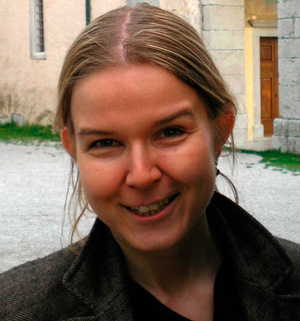- ON THE DECADE
- THE DECADE'S CAMPAIGN
- REPORTING ON PROGRESS
- THE DECADE'S PROGRAMMES
- FOCUS AREAS
-
- Access to sanitation
- Financing water
- Gender and water
- Human right to water
- Integrated Water Resources Management
- Transboundary waters
- Water and cities
- Water and energy
- Water and food security
- Water and sustainable development
- Water and the green economy
- Water cooperation
- Water quality
- Water scarcity
- FOCUS REGIONS
- RESOURCES FOR
- UN e-RESOURCES
2014 UN-Water Annual International Zaragoza Conference. Preparing for World Water Day 2014: Partnerships for improving water and energy access, efficiency and sustainability. 13-16 January 2014
Interviewing Annukka Lipponen, UNECE
Annukka Lipponen is Environmental Affairs Officer at the United Nations Economic Commission for Europe (UNECE).
 "The exercise of looking at cross-sectoral inter-linkages from all sectors’ perspectives is a very valuable tool, including also identification of external factors and trends, as well as potential and applicable solutions".
"The exercise of looking at cross-sectoral inter-linkages from all sectors’ perspectives is a very valuable tool, including also identification of external factors and trends, as well as potential and applicable solutions".
What are your expectations on the Zaragoza Conference on partnership for improving Water and Energy (W&E) efficiency and sustainability?
Learning about good practices in different regions of the world, and establishing contacts. I also expect to get some valuable feedback on the approach developed for assessing inter-linkages between water and energy within the water-food-energy-ecosystems nexus in the initiative under the UNECE Water Convention which I will present on at the conference.
Why are partnerships for improving Water and Energy (W&E) efficiency, sustainability and access to water and energy an important theme for UNECE?
The theme is very relevant for the above-mentioned inter-sectoral assessment, supporting reconciling of different uses of water but also of other resources. It is clear that many decisions outside the sphere of water resources management, including energy policies, impact on the status of waters. In order to better 1) protect transboundary waters by preventing, controlling and reducing transboundary impacts, and 2) to promote reasonable and equitable utilization of shared waters (both are among the obligations of the UNECE Water Convention), an improved understanding of the inter-dependencies between water and energy, as well as inter-sectoral impacts is necessary. Striving towards higher efficiency and sustainability in the use of one resource commonly brings co-benefits also for the other resource.
What are some challenges and opportunities for implementing your methodologies in relation to the energy and water nexus?
Among the challenges is the different scale of planning and management of the two resources which also has implications for the necessary scope of assessment. Another challenge ― which also represents an opportunity ―is an active and effective participation of all the relevant stakeholders. It demonstrates the value that some participants to the latest basin assessment process explicitly highlighted the relevance and need of a nexus (inter-sectoral) approach to national policies and transboundary cooperation.
Lessons that can be learnt from effective partnerships between the energy and water stakeholders on the energy-water nexus: Sharing and integrating knowledge and expertise?
Concerning integrated assessments, it is important to have a sufficiently broad and balanced participation in the process representing the different resource uses and stakeholder needs, and to mobilize the knowledge in the countries and locally. The exercise of looking at cross-sectoral inter-linkages from all sectors’ perspectives is a very valuable tool, including also identification of external factors and trends, as well as potential and applicable solutions. It is important that all sectors are given space in the discussion.
How can this Zaragoza Conference in your opinion contribute to improving the nexus of W&E?
The Zaragoza conference can be an excellent occasion to share experiences and identify opportunities for cooperation between actors from the water management/services and the energy sector. This is helpful for improving understanding and for learning from each other.
>> The challenges
>> The focus
>> The themes
>> Objectives and expected results
>> Agenda
>> Conveners and partners
>> Participants
>> Conference daily
>> Opening press release
>> Presentations
>> Closing press release
>> Integrated Energy-Water Planning and Investments
>> Industry partnerships to ensure water and energy efficiency and sustainability
>> Local Partnerships on Water and Energy
>> Policy Research and Innovation Partnerships
>> 14 Jan. World Water Day 2014
>> 14 Jan. Challenges for water and energy in Spain
>> 15 Jan. Side breakfast. Legal and tenure aspects on water and energy
>> 15 Jan. Managing the nexus on water and energy in Spain
>> 15 Jan. World Water Week 2014
>> SAIH
>> Canal Gestión
>> Propelling water with photovoltaic energy
>> Valdespartera Eco-City and Sustainable Town Planning Center
>> Cases on water and energy partnerships
>> Information briefs on Water and Energy
>> Interviewing conference participants
>> Reader on water and energy
>> Video interviews
Copyright | Terms of use | Privacy notice | Site Index | Fraud alert | Help





